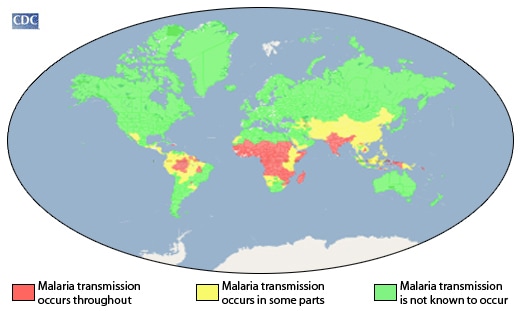
Last week in my microbiology class we had a guest speaker, Dr. Greg Wilson, come in and lecture on malaria. I learned a lot of things about this disease. Did you know that it is the 8th most common cause of death in the world? You can see the entire list here of the most common ways to die. Roughly 40% of the world population is at risk of contracting malaria. About 800 million people per year actually get malaria (that's 800 millions NEW cases per year, not just how many people have it). From all of those with malaria, about 2 million people die a year. The vast majority of those who die are little children.
Those numbers are so big that it's hard to imagine they widespread catastrophe that malaria causes. Dr. Wilson quoted Stalin, who said, "One death is a tragedy, one million deaths is a statistic." I know I don't have any real emotional ties to 2 millions deaths. I figure I would have the same emotional reaction if one million people died, or three million. This is the wrong way to look at these numbers. Dr. Wilson then pulled up a picture of a preschool classroom with about 15 kids in it, kind of like this one, and said, "Imagine every kid in this picture died of malaria. Now imagine that 100,000 classes just like this died, too. That's what happens every year."
He went on the describe the pathogenic mechanisms of malaria (how the mosquito gets it, how it is passed to people, how is makes red blood cell explode every 48 hours, and so on). There really is no cure for malaria. Once you contract it you basically will always have it. It hides in your red blood cells and your body doesn't want to destroy them. So instead of eradicating it, your immune system slows down it's growth until you don't really feel sick anymore. There are treatments that help, though. They used to issue a medication called mefloquine to missionaries serving in areas where malaria was common, but that had some very undesirable side effects (extremely vivid nightmares--they had problems with depression and suicide), so they now issue a different medication, doxycycline, that has some better (meaning less bad) side effects.
The big problem with malaria is that it's something like a Teufelskreis. People in undeveloped countries get sick because they don't have the medication or social infrastructure to eradicate malaria. Because they are sick and feel crummy all the time, they are unable to work and earn money. Because they don't have money, they can't afford to get the treatment they need. The problem with malaria is really an issue of poverty. Malaria shouldn't be on that top ten list of most common ways to die. It is within our power as a people to stem the tide of malaria. Dr. Wilson asked us what we can do to help. That's where it gets hard. How can we help?
It turns out that the mosquitoes that carry malaria only bite at night. There are many different types of mosquitoes, but only a certain type can carry malaria, and they only bite ate night time. Up to 30% of deaths can be prevented if people would sleep under a bed net. They are fairly inexpensive (only $10), and with one net a mother and a child can sleep peacefully. He challenged us to raise awareness and donate of our means so that malaria's effects will be lessened.
6 comments:
This is good information. I like the word, "teufelkreis" (not sure I spelled it right...) with the literal translation. This is a really good cause. Can you post some links for how we can help?
It's so amazing to me that something as simple as a mosquito net to sleep under can eliminate so many malaria deaths. Mind-blowing. I know that oxfam(.com? .org?) has some nets you can "buy"
Where do we send the net?
I thought I would let everyone know that tomorrow's post will be on where you can donate and how you can help. Stay tuned!
Hi,
Thought this might interest you:
Professor Coll-Seck, the Director of the Roll Back Malaria partnership will be LIVE on the Guardian Katine blog tomorrow 03 March at 1pm (GMT) to discuss the complex issues of malaria treatment and eradication. Please join the debate!
Forgot to give you the link...and the right date: that's TODAY 04 March.
http://www.guardian.co.uk/katine/katine-chronicles-blog/2010/mar/02/awa-marie-coll-seck-malaria
Thanks
Post a Comment